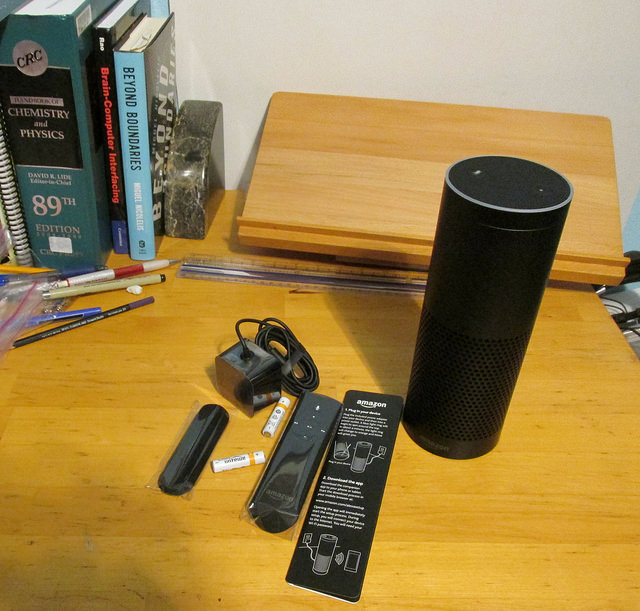
By Kady Enright, Staff Writer
Law enforcement in Bentonville, Arkansas, served a warrant on Amazon requesting voice recordings from the Echo device of James Andrew Bates.[1] Bates is accused of murdering Victor Collins in November 2015.[2] Echo is a voice-activated, home personal assistant; it can perform various tasks — such play music, order items online, or answer questions — and can control systems in the home, such as turning on lights.[3] Law enforcement believes there could be information relevant to the case in the Echo voice recordings, but Amazon has refused to comply with the warrant in order to protect its customers’ privacy rights.[4] This case presents some pressing questions about privacy and the increasingly prevalent “always-on” microphone device.
Echo, like other similar devices, is always listening for its “wake phrase.” The wake phrase is a short phrase or word, such as “OK, Google,” “Alexa,” or “Hey, Siri,” which the device is programmed to recognize. When triggered by the phrase, it begins listening and an audio recording is made and processed through the cloud.[5] These recordings are stored by Amazon either on Amazon servers or the device itself in order to improve Echo’s functionality.[6]
Arkansas law enforcement are not certain there will be any useful information on Bates’s device, but a different smart device in his home has already provided a clue.[7] Bates had a smart water meter, which showed unusually high water usage on the night of the murder.[8] Police believe that the increased water use was due to Bates hosing off the patio and hot tub area where Collins was found dead.[9]
Courts often consider information provided by users to third parties as not being subject to protection by the Fourth Amendment. Law enforcement did not need a warrant to access Bates’s water usage information; it is legally unclear, however, if Amazon will be required to turn over the requested recordings.[10]
This case presents a tricky question. Although privacy in our devices has been diminishing in recent years, these “always on” personal assistants are almost strictly for use in the home — a place that has historically been covered by broad Fourth Amendment protection. As the Supreme Court opined in Silverman v. United States,[11] “[a]t the very core [of the Fourth Amendment] stands the right of a man to retreat into his own home and there be free from unreasonable governmental intrusion.” In Silverman, law enforcement, through a neighbor’s home, inserted a microphone into the wall of defendant’s home without a warrant. The Court found this to be an unlawful intrusion, stating, “[t]his Court has never held that a federal officer may without warrant and without consent physically entrench into a man’s office or home, there secretly observe or listen, and relate at the man’s subsequent criminal trial what was seen or heard.”[12] This is similar to the Arkansas case because law enforcement is trying to gain access to conversations in the home by serving a warrant on a third party.
It remains to be seen whether the data on home smart devices will be afforded greater protection than, say, data on a cellphone. What is clear from recent developments in technology and privacy[13] is that this is an issue the legislature needs to tackle. Americans should not have to censor themselves from their own home devices. Congress needs to set up safeguards against this type of data being used against Americans.
Sources
[1] Jake Swearingen, Can an Amazon Echo Testify Against You?, nymag.com (December 27, 2016, 12:02 PM), http://nymag.com/selectall/2016/12/can-an-amazon-echo-testify-against-you.html.
[2]Mark Masnick, Amazon Refuses To Comply With Police Request For Amazon Echo Recordings In Murder Case, TechDirt.com, (December 28, 2016, 3:54 AM), https://www.techdirt.com/articles/20161227/12042636351/amazon-refuses-to-comply-with-police-request-amazon-echo-recordings-murder-case.shtml.
[3] Britta O’Boyle, Amazon Echo: What Can Alexa Do and What Services are Compatible?, Pocket-Lint (December 26, 2016), http://www.pocket-lint.com/news/138846-amazon-echo-what-can-alexa-do-and-what-services-are-compatible.
[4] Elliot McLaughlin and Keith Allen, Alexa, Can You Help Us With This Murder Case?, CNN.com (December 28, 2016, 8:48 PM), http://www.cnn.com/2016/12/28/tech/amazon-echo-alexa-bentonville-arkansas-murder-case-trnd/.
[5] Joseph Jerome, Alexa, Is Law Enforcement Listening?, Center for Democracy and Technology (January 4, 2017), https://cdt.org/blog/alexa-is-law-enforcement-listening/.
[6] Id.
[7] Mark Masnick, Amazon Refuses To Comply With Police Request For Amazon Echo Recordings In Murder Case, TechDirt.com, (December 28, 2016, 3:54 AM), https://www.techdirt.com/articles/20161227/12042636351/amazon-refuses-to-comply-with-police-request-amazon-echo-recordings-murder-case.shtml.
[8] Id.
[9] Id.
[10] Joseph Jerome, Alexa, Is Law Enforcement Listening?, Center for Democracy and Technology (January 4, 2017), https://cdt.org/blog/alexa-is-law-enforcement-listening/.
[11] Silverman v. United States, 365 U.S. 505, 511 (1961).
[12] Id.
[13] See, e.g., http://sites.law.duq.edu/juris/why-fingerprints-are-actually-less-secure-than-passcodes/